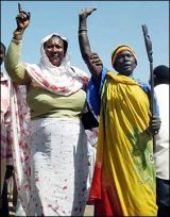FEATURE-Sudan’s women hope for peace, divided over sharia
By Opheera McDoom
KHARTOUM, Jan 7 (Reuters) – Sudanese women have remained conservative, covered and mostly out of power under the Islamist government which overthrew a short-lived democracy in a bloodless military coup some 15 years ago.

|
|
Sudanese women, one from the north (L) and one from the south hold hands as they chant ‘sawa, sawa’ (together) during celebrations in Khartoum, 01 January 2005. (AFP). |
Now, inspired by hope that democracy will follow a peace deal to end more than two decades of civil war in the south of the country, some women are throwing off conservative tendencies, defying the conventional preference for marriage over work and seeking roles in the flourishing world of Sudanese opposition parties.
Niemat Kheir, widow of the first leader of Sudan’s Communist Party, says women in Sudan have had to work because the husbands of many have been sent off to fight in the war.
“This happened, … even more in the south. The men were either killed or were fighting and the wife was the family support,” she said.
Since independence from Britain in 1956, Sudan’s non-Islamic south has been embroiled in brutal civil war for all but 11 years. The latest war, which broke out in 1983, has claimed more than two million lives. It has been complicated by issues of oil, ethnicity and ideology.
But unchanged values still appear to mostly override economic considerations in the Islamic north, where many people support Sharia or Islamic law, introduced in 1983.
Halima Ahmed, a journalist who declined to use her real name, broke off her engagement after refusing her fiance’s request to stop working once they were married.
She is one of a small but growing number of women in their late 20s or early 30s, still unmarried and unperturbed, enjoying the limited freedom their low-paid jobs allow them.
Dressed conservatively with traditional long skirt, blouse, head scarf and even wearing gloves under the burning sun in the dusty city of Khartoum, Ahmed said the mentality of both Sudanese men and women had yet to reflect the changing reality. “It is difficult to find a Sudanese man who will let his wife continue to work after marriage,” she said.
A representative of Sudan’s umbrella opposition group, the National Democratic Alliance (NDA), Buthaina Hamid Khorasani, said change was partly a result of increased education for women, as there were now more women in university than men.
“Women in Sudan are very strong if you give them a chance,” she said, adding that post-Sharia governments would publicly beat, whip or harass women for not dressing properly or even for drinking tea or coffee on the streets.
WOMEN IN POLITICS
While more women are becoming educated and working, top jobs, especially in government, still elude them. Of Sudan’s 40-member cabinet, dominated by the ruling Islamist party, only three or four junior posts have been allocated to women.
In opposition, both Islamist and secular parties have women in the top tiers of power. The popular Umma party has the leader’s wife in the politburo and daughter as the spokesperson, and Islamist Hassan al-Turabi’s wife is a powerful member of the leadership of his Popular Congress party.
Wisal al-Mahdi, Turabi’s wife and the sister of Sadiq al-Mahdi, the Umma party leader, said she owed her political participation and education to her family and upbringing. The powerful and wealthy Mahdi family has dominated Sudanese politics since independence.
Kheir, a leading member of the Communist party before she met her husband, said women should be given political posts on merit.
But she acknowledged it helped the women’s movement to have the wives and families of prominent men in positions of power.
“Of course it helps, but these women usually follow their husbands, rather than uniting women,” Kheir said. The Communist Party was the forerunner in women’s rights and in allowing female membership.
Wisal al-Mahdi supports Sharia law, which many say is now one of the biggest obstacles to a united women’s movement in Sudan. “Women have a special role to play in society. Women can enter into politics at a certain (older) age when the house can run itself,” she said.
SHARIA DIVISIONS
Nafisa Ahmed el-Amin, who spearheaded the female emancipation movement in Sudan more than 50 years ago, fears the question of Sharia law will divide the women’s movement, which she said lost direction as a succession of military dictatorships overran the trade unions and other institutions which sprung up during Sudan’s flings with democracy.
Still a teenager when she led her fellow classmates in one of the most progressive women’s movements of its time in 1950s Africa, Amin sighs when she looks back at what was lost when military governments destroyed the women’s union she founded.
“Women in Sudan got the vote in 1963, but we have been constantly stopped by the loss of democracy,” she said.
Although a number of Sudan’s influential women oppose Sharia, few dare to admit so in public.
Kheir is one of the few brave enough to speak out. She has been imprisoned and harassed for years for her political beliefs. “We need to leave Sharia law to those who are Muslims to decide,” she said from her home in Khartoum.
